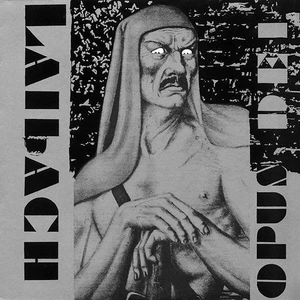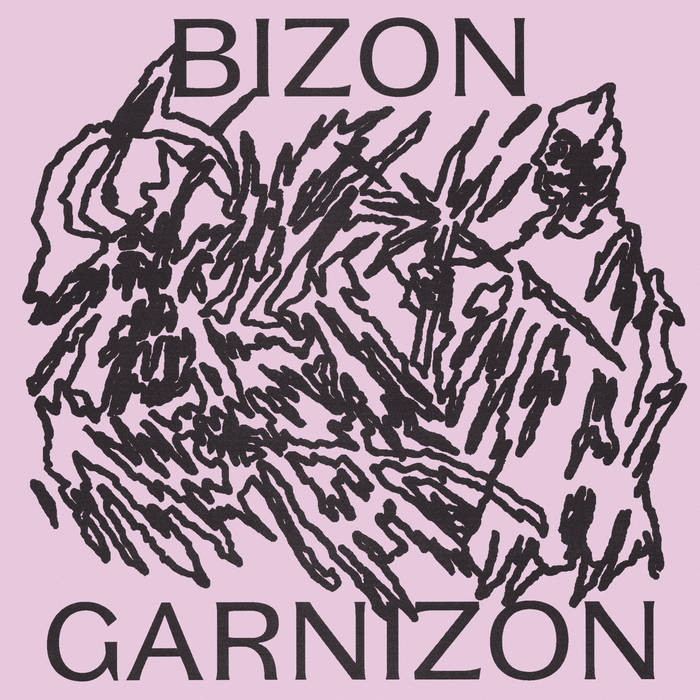What do you do when your very name gets banned in your own country?
If you’re Laibach, you lean into it. You double down. You build an entire mythos from irony and absurdity — and then you put it to music that sounds like a tank rolling through a factory.
Laibach formed in the late ’70s in the industrial town of Trbovlje, Slovenia. Before the release of Opus Dei in 1987, the group had already been banned from performing under that name, denounced by the Yugoslav authorities, and wrapped themselves in so much visual provocation that practically nobody, fans or critics, could quite decide where the joke ended and the revolution began.
The album opens with Leben Heisst Leben, a snarling, militarised cover of Austrian pop group Opus’ “Live Is Life”. This version, though, swaps out optimism for pounding martial bass and organ stabs straight out of some dystopian parade. The vocals bark, the synths glisten, and then — out of nowhere — a completely over-the-top guitar solo slashes through the middle. It’s so misplaced and extra, you can’t help but laugh and nod your head…
Later on, the title track, Opus Dei, returns us to “Live Is Life”, this time in English. Somehow, it’s even more unsettling. The heavy instrumentation, the repeated mantra, the way the vocals strain under the weight of their own bombast. The title here comes from the polarising Catholic institution, Opus Dei, meaning God’s Work in Latin.
Then comes Geburt Einer Nation, a German-language cover of Queen’s “One Vision”. The title translates to Birth of a Nation — a deliberate nod to D. W. Griffith’s infamous 1915 film, which was as groundbreaking as it was grotesquely racist. On the surface the track is satirical, but peek deeper, and you find a totalitarian reimagining of a rock anthem on the topic of unity, slapped with the label of one of the most racist films ever created. It’s almost surreal how the lyrics take on a more sinister tone simply through context: “one man, one soul, one mission”. As the vocals border on grotesque, and the pounding parading bass continues, there’s a razor-sharp absurdity here that’s easy to miss.
As the album progresses, the tone deepens. Leben: Tod shifts dramatically into heavier industrial terrain. Gone is the ironically deep pop cover — in its place, throbbing mechanical noise and unrelenting vocals that veer toward genuine terror. This is the Laibach that would go on to influence the likes of Nine Inch Nails and Ministry.
F.I.A.T. takes things even further. It starts with haunting neoclassical synths, like the score to a ceremony you were never supposed to witness. Then, through the static, a robotic voice emerges: “You are in black darkness and confusion. You cannot win this war.” It’s both chilling and captivating — Kraftwerk electronics hacked by some viral worldwide-AI menace. Suddenly, you’re not just listening to an album — you’re part of a cyberpunk nightmare.
By the time we get to Trans-National, the album starts to unravel in the best way. It’s frenetic, electronic chaos — a high-speed detour into noise and pulse. You can hear echoes of The Downward Spiral here, or even some of the darker corners of industrial. But there’s still that undercurrent of theatrical satire as we continue into How The West Was Won with abrasively dissonant guitars and collapsing rhythms.
People often compare Laibach to Rammstein, but here the differences are clear: where Rammstein are polished arena metal, Laibach are deliberately unrefined and original. This isn’t industrial rock built for radio play, instead, it’s layers of ideology, politics, history, and media ground together in a crushing pestle and mortar.
The Great Seal closes out the record with operatic grandeur. It sounds like a national anthem written by a cybernetic ghost, which makes sense — it is technically the national anthem of the NSK State (when it was later re-arranged on Volk), Laibach’s fictional art nation (Neue Slowenische Kunst, German for New Slovenian Art). The finale feels both glorious and ridiculous — do we salute or drop down in hysterics as Winston Churchill gives his “We shall fight on the beeches” speech?
Opus Dei isn’t an easy record to categorise — or even to fully grasp. It took time, research, and reading between the lines to appreciate its nuance. The record is both funny and frightening — often walking a tightrope between earnest and surreal without warning. But that’s the Laibach magic: they don’t ask to be understood — they ask to be questioned. And in that sense of disorientation, something deeper than satire is revealed.


